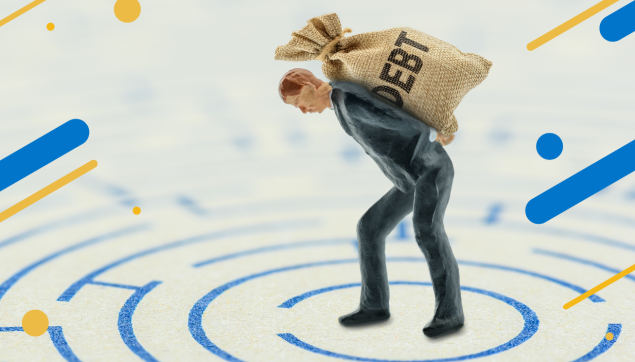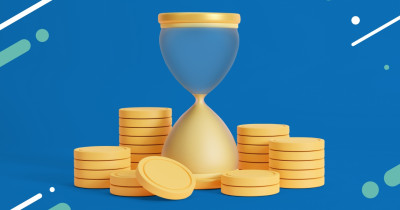What debt review really means for your financial future

Published on 28th February, 2023 at 05:53 pm
It’s what many are resorting to as the cost of borrowing continues to increase, but what are the real financial consequences of entering debt review?
Reading time: 4 minutes
In this article you’ll learn:
- What debt review entails, and the implications thereof.
- The advantages and disadvantages of debt review, and considerations to have before entering this process.
- The importance of responsible credit, and how a financial planner can help you reach financial freedom.
From increasing interest rates to inflation sitting at an all-time high, it’s no surprise that South Africans in debt are turning to debt review (or debt consolidation) as a solution.
According to Statista, the national debt of South Africa is forecast to continuously increase between 2022 and 2027 by USD158.6 billion, or R27.7 trillion based on today’s exchange rate. To add, the country’s national debt is estimated to hit USD409.13 billion, or R713 754 trillion, by 2027. The numbers are alarming; however, as much as debt review may sound like the obvious next step when you cannot manage your debt, it’s not the right answer for everyone. While it could be seen as a lifeline, there are far-reaching implications that should be considered.
Debt review in a nutshell
Debt review is a process regulated by the National Credit Act whereby over-indebted consumers can be protected against credit providers. “During the process, a debt counsellor draws up an income and expense document and thus determines how to compile a debt repayment plan,” says Debt Review SA. The result of debt review for the individual is that all their debt is consolidated into one monthly payment, and they are protected against being blacklisted.
What to consider about debt review
“Most people don’t understand the implications of debt review – that it is a voluntary formal court application made to place yourself under debt review,” warns Jyoti Gopee, a financial planner at Pinnacle BlueStar, authorised Sanlam. According to the National Credit Act’s (NCA) website, you can’t apply for credit once under debt review, and only once all short-term debt (excluding a home loan) has been settled will a debt counsellor issue a clearance certificate, inform the credit bureaus to remove the debt counselling flag and remove all information relating to a consumer’s debt. Gopee adds that while reduced repayments are a huge attraction for immediate financial relief, the fact that you cannot access any credit facilities while under debt review is problematic.
During debt review, you are considered over-indebted, which means you’re no longer able to meet your monthly debt obligations. The National Credit Act enables voluntary withdrawal from the debt review process after a consumer has applied for debt review. However, it’s up to you, as the consumer, to prove that you are no longer over-indebted – a process that may prove to be both lengthy and costly.
The Sanlam Money Saver credit card can help you save while you spend when used responsibly. If you choose to commit to saving with the Sanlam Money Saver credit card and shop at Reward Partners, you’ll get 5% added to your Wealth Bonus, except at TotalEnergies forecourts. If you fill up at TotalEnergies, you earn R1 back per litre of fuel, guaranteed! Find out more.
What about your credit profile?
Afua Twum-Darko, platform client engagement manager at Sanlam Credit Solutions, discusses the impact that debt review can have on an individual’s credit profile: “While under debt review, there is a flag on the individual’s credit report as a way to mitigate reckless lending,” she says. “However, when they have paid up all their debt and a clearance certificate is issued, the flag is removed, and the consumer’s credit report is cleared of that debt. There are no restrictions on their financial future, and they are able to start to build a good credit record going forward.”
“The biggest advantage of debt review would be the reduced consolidated instalment,” says Twum-Darko. However, she sees the freeze on new credit applications as positive: “The freeze prevents individuals from putting themselves further in debt, by taking them out when they are already struggling to manage their current credit requirements.”
The good news is that there are alternatives to consider before entering a debt review.
Alternatives to debt review
Gopee recommends having a discussion with a financial planner as the first (and most critical) step if you feel you cannot manage your current debt.
“You can call each of your debtors and make your own reduced payment arrangement – without having to go under formal administration,” she continues. That said, she believes that there’s still a place for debt review.
Feeling anxious about debt? Read this to set yourself free.
“There are some individuals who continue to create debt for themselves and find every excuse or reason to justify debt. If you observe the assets and liabilities and cash flow of the same individual over a three- to five- year period, you’ll notice that their debt continues to increase with no light at the end of the tunnel. In these circumstances, debt review provides the structure and discipline to get out of the cycle of debt.”
If you’re struggling with your debt levels, it’s important to speak to a financial expert about your situation so you can be set financially free and live with confidence. Book a meeting with one today, here, and you can earn 8 000 tier points.
Want to learn more?
We send out regular emails packed with useful advice, ideas and tips on everything from saving and investing to budgeting and tax. If you're a Sanlam Reality member and not receiving these emails, update your contact details now.
Update Now







